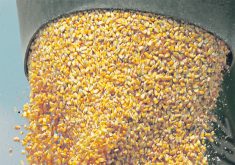The Black Velvet distillery in Lethbridge, Alta., would like a red carpet treatment for imports of American corn.
Company officials with the distiller have asked the Canadian International Trade Tribunal for an exemption allowing it to import corn from the United States without paying a duty.
They said their plant could close if they can’t buy U.S. corn at the same price as large American competitors.
The company has bought more than 90 percent of the corn it uses from the U.S. for the past 20 years, said plant manager Rory Wright at a CITT hearing Feb. 6.
Read Also

Chinese, Indian tariffs take toll on pea prices
The disruption of pea exports from Canada’s largest customers will likely result in slow pea exports for the remainder of the crop year.
A CITT panel is examining whether Manitoba corn growers have been injured by large imports of dumped and subsidized U.S. corn. Dumped refers to corn sold at prices below cost of production.
Wright said his plant also buys corn produced by a dozen growers from Bow Island, Alta., to blend with the U.S. corn when the plant runs short on supply.
But short-season corn grown in Western Canada doesn’t contain enough fermentable carbohydrates, he said.
Black Velvet needs corn with at least 75 percent starch, which is found only in corn grown south of Highway 200 in North Dakota, according to the distillery’s broker Jan Leishman.
“I’ve been around for a long time and I know what certain customers require,” she said.
Robert Pigott, distilling manager at Black Velvet, said the plant’s alcohol yields would plummet if it had to use Manitoba corn. That would likely lead to lost contracts for grain neutral spirits, a kind of bulk alcohol the plant sells to other distilleries for making vodka, gin and liqueurs.
These contracts are the plant’s mainstay, Pigott said.
Michael Coates, president of the Manitoba Corn Producers Association, told the panel he didn’t understand why Seagram Canada can use Manitoba corn for its whisky but Black Velvet cannot.
Michael Flavell, lawyer for Black Velvet, explained the company focuses on a different market with thinner margins.
After questioning from Flavell, Manitoba corn growers admitted they have not tried to pitch their corn to Black Velvet, leaving the marketing to brokers who buy and sell their corn.
Leonard Buhler, who grows corn near Winkler, Man., said he had never tested the starch content of his corn, but saw the issue as an opportunity.
“The whole starch thing is a new thing for me,” he said.
Kelvin Smith, a corn grower from Carman, Man., said he understood high bushel weight translates into high starch content, and explained Manitoba farmers can produce high bushel weights.
But Pigott said there was no relationship between density and starch content.
Even if Manitoba growers could supply the kind of corn Black Velvet needs, Leishman said they would have a hard time getting it to the plant.
Trucking corn from Manitoba to Alberta is uneconomical, she said, and trucks are not easily unloaded at the distillery.
Rail car allocation, spotting and movement are unreliable in rural Manitoba, she added.
Decision
The panel is expected to decide March 7 whether Manitoba farmers have been injured by corn imports, and whether a duty on U.S. corn should continue.
If it rules in favor of the farmers, the panel also has the authority to grant exclusions to the duty.
Manitoba corn growers have said they do not object to exclusions requested by snack food makers, a specialty flour manufacturer, organic dairy farmers, and Seagram.
Seagram buys most of the corn it uses in Manitoba, but needs a small amount of high quality corn from Indiana for flavoring bourbon-type whisky.
“It reminded me of my friends in New York who say, ‘What are we? Chopped liver?'” said Flavell, who argued Black Velvet’s imports won’t harm Manitoba farmers since the company can’t use their corn anyway.
Seagram lawyer David Attwater argued Black Velvet would have an unfair competitive advantage if it could buy U.S. corn without the duty.
Attwater said if the panel grants Black Velvet exclusion, it should also give the same exclusion to Seagram.
“That would be absolutely devastating for the people who supply (Seagram),” noted Peter Clark, lawyer for the Manitoba corn growers.














